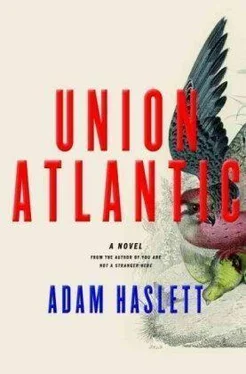The other line started to ring and he told Cannistro to hold.
“Did that jackass get a hold of you yet? What an idiot, huh? An upstate strip-mall bank betting on Chávez! Did you get a load of that? What a goddamn mess.”
Sid Brenner, head of payment systems. The master plumber, as they called him, the man with his fingers on the dials. You could count on two hands the number of people capable of programming the network that wired that trillion a day through the market. Most of them worked at IBM. Sid had been with the Fed thirty-five years, starting just a few months before Henry. Born in Crown Heights, he lived there still — three kids, one an officer in the Israeli army, the other two professors. Any day of the week he could have walked down the Street and made five times what the Fed paid him, but he never had.
“We’ve got time,” Henry said, a half-truth they would let pass between them. “I’ll get on the phone. We’ll work it through.”
“None of my business, but if you give these jerks a free ride, I’ll wring your neck. They should be lucky to get a loan at eight percent.”
“I’ll talk to Holland. Did everything else settle?”
“Yeah, just a gaping hole in Taconic’s reserve account.”
“What’s your sense of who else knows at this point?”
“About the swap in particular? Not so many. That they’ve been scrambling for money for eight hours? Not exactly a secret.”
Henry woke his secretary, Helen, at home and asked her to set up the calls with Holland and Taconic’s management, as soon as the car reached them.
As they were about to hang up, she asked, “Are you all right?”
He crossed the room and pulled the curtains aside. Through the glass he could see down to the beach, where the lights from the hotel reached the tranquil water’s edge. He slid the door open and stepped onto the balcony, the night air heavy with moisture.
Like Sid, Helen had been at the Fed for decades, starting out as Henry’s assistant in the counsel’s office and moving with him to the presidency. When they were together, priorities sorted themselves in the space between them with little more than a glance or nod. She could interpret the nuance of a bank officer’s evasions as readily as the nervous chatter of some freshman analyst. He disliked involving her in personal matters but ever since Betsy had died four years ago, he’d found it impossible to meet his own standard of segregating entirely work and private life.
“Did my sister call?”
“No. There’s been no word.”
He rested his forearms on the railing, feeling in the thickness of his head the pitched forward slowness of jet lag. The flight from Frankfurt had been ten hours, the drive up from Miami all stop-and-go traffic owing to a jackknifed truck that had torn the roof off one of those Volkswagen bugs, the whole scene bright as day under halogen floods.
A few weeks ago, after listening to one of Charlotte’s tirades about the house next door, he’d raised the question of whether it might be time for her to move. She’d practically hung up on him and had replied to none of his phone calls since.
“I’m sorry you’ve had to deal with this,” he said to Helen. “It’s unprofessional of me.”
“Don’t be silly,” she replied. “Do you need anything else? It could take awhile to get Holland at this hour.”
“No. Just the account positions. And I suppose you better call down to D.C. and find out where the chairman is, just in case. I don’t think we’ll need him.”
“By the way,” she said. “Did you speak to the plumber about the leak at the house?” He had happened upon it the other evening in the back hall, a rust-colored sagging in the wallpaper over the side table. “It’s not the kind of thing you can just forget about. You could get a burst pipe.”
In which case, what? he thought. Water in the living room? A lake beneath the piano? He barely used the downstairs anymore, getting home after ten most nights and heading straight to bed. Even upstairs he’d withdrawn into one of the guest rooms, where he found it easier to sleep surrounded by fewer of Betsy’s things. His wife’s death had hit him with startling force for a month or two, during which his body ached from the moment he woke to the moment he went to sleep. But his job’s demands didn’t cease. And soon there were days when he thought of her less often; half a year later there were days he didn’t think of her at all. This seemed wrong, inhuman even, that forty years of marriage could fade so easily through a slip in time. Did it mean he was a callous person? Unfeeling? Who was to judge? As for his private life now, the person he thought of, whom in a sense he’d always thought of, was his older sister, Charlotte. A woman Betsy had done little more than tolerate.
“If you give me the plumber’s number,” Helen said, “I’ll call him myself.”
“No,” Henry replied. “It’s all right. I’ll see to it when I get back.”
DOWNSTAIRS, THE COCKTAIL lounge was deserted save for an elderly Latino man in a vest and bow tie reading a newspaper behind the bar. Basketball from the West Coast played in silence on the television mounted above his head. Henry ordered a ginger ale and walked out onto the terrace, taking a seat at a table by the steps to the lawn. Between the hotel and the ocean stood a row of shaded palms lit from beneath, their fronds perfectly still. Waves barely lapped at the shore. The big investment houses had made a killing on resorts like this, consolidating the industry, securitizing the mortgages, first in line to get paid when a chain went bankrupt, first in line to finance the entity when it reemerged.
The ginger ale had too much sweetener and not enough fizz. Another penny for Archer Daniels Midland and the corn-syrup giants.
Stop, he thought to himself. Enough.
He could never tell if exhaustion bred the automatic thought of production and consequence or whether the habit itself did the tiring. Either way, it had become incessant. As an undergraduate, studying philosophy, his first challenge had been skepticism, how the mind could know with certainty that objects existed. By the time he went to law school, he’d settled happily on a social, pragmatic answer: that to believe otherwise led to absurd results. These days much of the world seemed drained of presence to him, not by his doubt of anything’s existence but because objects, even people sometimes, seemed to dissipate into their causes, their own being crowded out by what had made them so.
Over the gentle surf, he heard the hum from the air-conditioning vents high on the roof of the hotel, and his brain, once more, ran the stimulus to ground: the steel smelted from ore mined on some island of the Indonesian archipelago; forged into sheets on the hydraulic presses of a foundry outside Seoul; shipped across the Pacific to sit in a warehouse in Long Beach where it showed up in the Commerce Department’s numbers on inventory; ordered, packaged, trucked over the plains to an Atlanta wholesaler; bought by a contractor in Miami, who stood with a foreman directing workers riveting the vents together, operating the crane that raised into place the engine, itself assembled with parts from ten countries or more at a Maytag plant out in Iowa or perhaps Mexico, calibrated to the precise wattage required to pump cooled air into the hundreds of sleeping chambers, where its faintly medicinal scent blanketed the slumbering travelers. And allowing each step from the miner’s lowly wage to the construction buy: loans, lines of credit, borrowed money — the vast creationary incentive of compound interest, blind artificer of the modern world.
He wondered how it would be if the humming were just that to him: a sound.
Leaving his glass on the table, he wandered out onto the lawn. He wouldn’t be able to sleep before he’d resolved Taconic’s troubles but until their CEO and Holland were on the phone there was nothing more he could do.
Читать дальше












